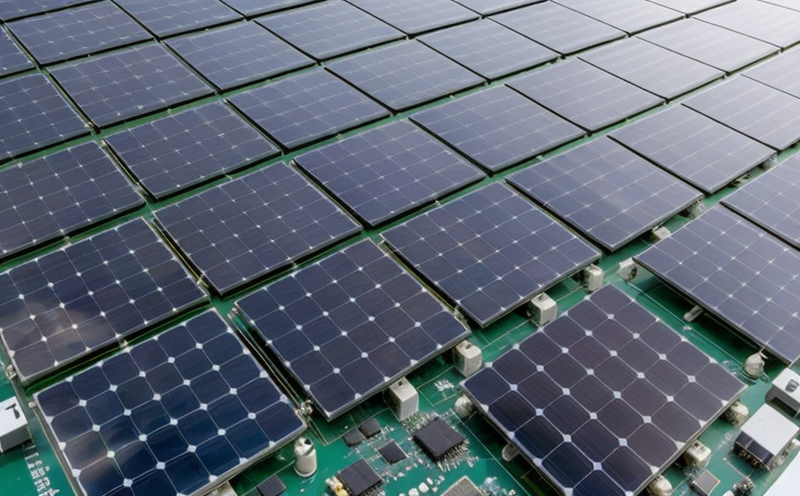IEC 62930 Cable Testing for Photovoltaic Systems
The International Electrotechnical Commission (IEC) standard IEC 62930:2017, "Test methods for the qualification of electrical cables and accessories used in photovoltaic systems," is a critical benchmark for ensuring the safety, reliability, and performance of photovoltaic (PV) system components. This standard focuses on the electrical properties of cables that are integral to PV installations, including their insulation and conductive integrity.
The primary goal of IEC 62930 testing is to ensure that these cables can withstand environmental stresses such as temperature fluctuations, moisture exposure, mechanical strain, and electromagnetic interference. By adhering to this standard, manufacturers and installers guarantee the long-term viability of PV systems, which are increasingly deployed in diverse climates around the world.
Photovoltaic systems convert sunlight into electricity through an array of solar cells connected by cables. The quality and reliability of these cables directly influence the efficiency and safety of the entire system. IEC 62930 testing ensures that the cables used meet stringent international standards, thereby reducing the risk of failures and enhancing overall system performance.
The standard covers a range of tests designed to evaluate different aspects of cable integrity:
- Dielectric strength tests assess the insulation's ability to withstand high voltages without breakdown.
- Mechanical endurance tests simulate real-world conditions, such as bending or twisting, to ensure that cables can survive installation and operational stress.
- Thermal cycling tests evaluate how well the cable retains its properties under varying temperatures.
The testing process for IEC 62930 involves a series of rigorous procedures. Initially, the cables are prepared according to specified guidelines to ensure consistent sample preparation across different laboratories. Once prepared, they undergo various environmental and mechanical tests that simulate expected operational conditions. The results from these tests provide detailed insights into the performance and durability of the cable.
Compliance with IEC 62930 not only ensures product quality but also facilitates global market access for manufacturers who can demonstrate adherence to international standards. This standardization is particularly important in today's rapidly expanding renewable energy sector, where interoperability between different PV systems is crucial.
The importance of IEC 62930 cannot be overstated, especially as the demand for solar power increases. By adhering to this standard, manufacturers and installers can ensure that their products meet the highest safety and performance standards. This commitment to quality and reliability contributes significantly to the overall success of PV systems.
In summary, IEC 62930 cable testing is essential for ensuring the long-term viability and safety of photovoltaic systems. By adhering to this standard, manufacturers can demonstrate their commitment to delivering high-quality products that meet international standards. This not only enhances product reliability but also facilitates global market access.
Applied Standards
The IEC 62930 standard is part of a broader framework for ensuring the safety and performance of photovoltaic systems. Other relevant standards include:
- IEC 61730-1: Module and string electrical safety requirements.
- IEC 62446: Safety of PV system components.
- IEC 62816: Protection against lightning for photovoltaic systems.
The interplay between these standards ensures that all aspects of PV installation are covered, from the modules to the cables and accessories. By adhering to multiple international standards, manufacturers can ensure comprehensive product safety and quality.
Competitive Advantage and Market Impact
- Enhanced Product Quality: Compliance with IEC 62930 ensures that cables used in PV systems are of the highest quality, reducing the risk of failures and enhancing overall system performance.
- Global Market Access: Adherence to international standards like IEC 62930 facilitates global market access for manufacturers who can demonstrate their commitment to safety and reliability.
- Increased Customer Confidence: By adhering to stringent testing protocols, manufacturers earn the trust of customers, leading to increased sales and brand loyalty.
- Regulatory Compliance: Many regions require compliance with international standards for PV installations. Adherence to IEC 62930 ensures that products meet regulatory requirements, avoiding potential fines or delays in deployment.
The competitive advantage gained from adhering to IEC 62930 is significant. Not only does it enhance product quality and reliability but also opens up new markets and opportunities for growth. Additionally, the trust and confidence of customers are crucial factors that can lead to long-term relationships and increased business success.
Use Cases and Application Examples
The IEC 62930 standard finds application in a wide range of photovoltaic systems. From residential installations to large-scale utility projects, the quality and reliability of cables are critical for ensuring system performance and longevity.
- Residential PV Systems: In smaller installations, such as those found in homes or small businesses, the quality of the cables can significantly impact the overall efficiency of the system. By adhering to IEC 62930, manufacturers ensure that these systems are reliable and safe.
- Utility-Scale PV Plants: In large-scale installations, the reliability of cables is even more critical due to the sheer size and complexity of the system. The testing protocols outlined in IEC 62930 help ensure that these systems can operate efficiently over long periods.
- Off-Grid Systems: In remote areas where grid connectivity is limited, reliable cables are essential for ensuring consistent power supply. Adherence to IEC 62930 ensures that these systems meet the highest safety and performance standards.
The testing procedures outlined in IEC 62930 are designed to ensure that cables used in PV systems can withstand various environmental stresses, including temperature fluctuations, moisture exposure, and mechanical strain. This is particularly important for off-grid systems where extreme weather conditions may be more prevalent.
By adhering to these standards, manufacturers can ensure the long-term viability of their products and contribute to the overall success of photovoltaic installations in various applications.





